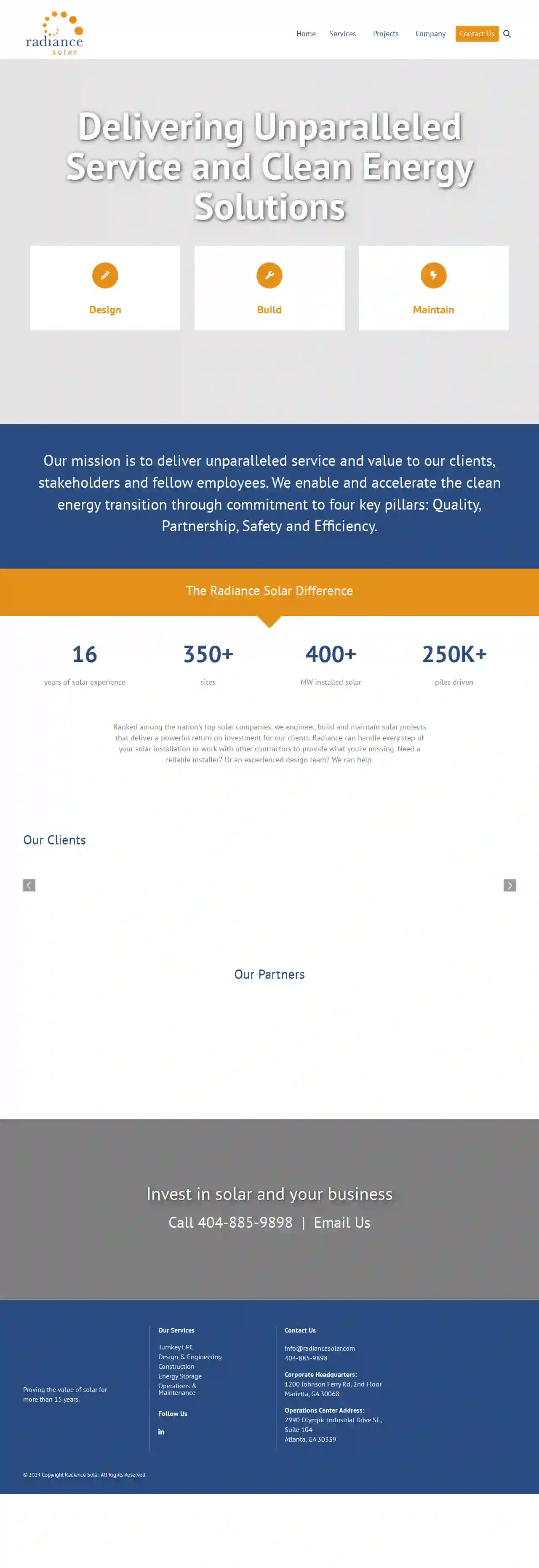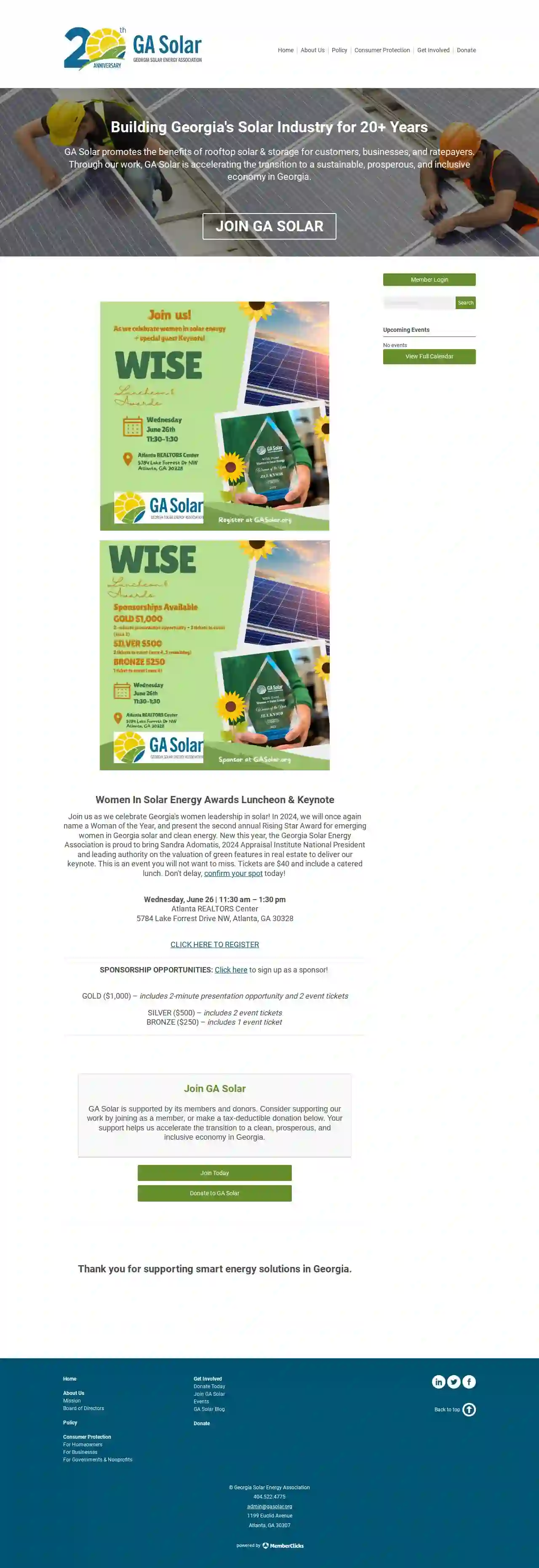Commercial Solar Installers Columbus
Top 10 Solar Panels For Businesses in Columbus
Receive up to 3 Commercial Solar Companies quotes for your project today! Compare profiles, reviews, accreditations, portfolio, etc... and choose the best service.

Solar Tyme USA, LLC
11 reviewsColumbus, GA, Suite 206, 416 12th St, 31901, USSolar Tyme USA, LLC is a female minority owned Columbus, GA based solar installation firm. We provide value by assisting our client's ability to hedge against inflationary facts via solar energy, energy efficiency upgrades, and energy audits. We assist homeowners, collective communities, and businesses by solving energy-burdensome challenges. Knowledge is power and empowering our customer base through education assists them to make one of the most important decisions of their lives.
- Services
- Why Us?
- Accreditations
- Our Team
- Testimonials
- Gallery
Get Quote
Solar Plus LLC
3.97 reviews715 Peachtree St. NE Suite 100, Atlanta, GA 30308, 30308, USSolar Plus is a full-service solar company serving Atlanta, Charlotte, Greenville, Columbia and beyond. The key to our success is that company president Don Tonic actively directs all solar projects, and is dedicated to the hiring, training, and retention of quality installation experts. The entire Solar Plus team is dedicated to delivering a quality solar electric system on every project.
- Services
- Why Us?
- Accreditations
- Our Team
- Gallery
Get Quote
Alternative Energy Southeast, Inc.
4.853 reviewsAthens, GA, 160 Collins Industrial Blvd, 30601, USAlternative Energy Southeast, Inc. is a team of Georgia solar professionals on the leading edge of our trade. We go above and beyond to ensure our residential, commercial & industrial, and government customers are treated with genuine integrity and their expectations are exceeded in every respect.
- Services
- Why Us?
- Accreditations
- Our Team
- Testimonials
- Gallery
Get Quote
Radiance Solar
4.19 reviews1200 Johnson Ferry Rd, 2nd Floor, Marietta, 30068, USRadiance Solar is a leading solar company with over 16 years of experience in the solar industry. They offer a range of services including turnkey EPC, design and engineering, construction, energy storage, and operations and maintenance. Their mission is to deliver unparalleled service and value to their clients, stakeholders, and fellow employees, enabling and accelerating the clean energy transition through commitment to four key pillars: Quality, Partnership, Safety, and Efficiency.
- Services
- Why Us?
- Accreditations
- Our Team
- Testimonials
- Gallery
Get Quote
Suncatcher of Atlanta
4.734 reviews1234 Solar Way, Suite 100, Atlanta, 30339, USSuncatcher of Atlanta is a solar energy company that specializes in providing solar electric, solar hot water, and pool heating systems. They have been in the industry since 1983 and offer a quality solar system for every budget. Their philosophy is to provide well-designed and engineered systems that are made to last with limited maintenance.
- Services
- Why Us?
- Accreditations
- Our Team
- Testimonials
- Gallery
Get Quote
Savannah Solar Power
55 reviewsSavannah, GA, 123 Solar Way, 31401, USSavannah Solar Power is a local business dedicated to providing sustainable solar power solutions to homes and businesses. They offer a range of services including solar panel installation, energy savings reports, and solar power plans. Their mission is to help customers reduce their carbon footprint and save money on their energy bills. They provide a 30-year warranty on their services and offer a $0 deductible.
- Services
- Why Us?
- Accreditations
- Our Team
- Testimonials
- Gallery
Get Quote
Georgia Solar Energy Association
1199 Euclid Avenue, Atlanta, GA 30307, 30307, USBuilding Georgia's Solar Industry for 20+ Years. GA Solar promotes the benefits of rooftop solar & storage for customers, businesses, and ratepayers. Through our work, GA Solar is accelerating the transition to a sustainable, prosperous, and inclusive economy in Georgia.
- Services
- Why Us?
- Accreditations
- Our Team
- Testimonials
- Gallery
Get Quote
Hannah Solar
3.130 reviewsBuilding 2400 Suite 110, Atlanta, GA, 3800 Camp Creek Parkway, 30331, USHannah Solar is a full service solar integrator dedicated to providing the very best in engineering, products, installation and operations & maintenance. We serve the Southeast and National Clients with headquarters in Atlanta, Georgia.
- Services
- Why Us?
- Accreditations
- Our Team
- Testimonials
- Gallery
Get Quote
South GA Solar Power
55 reviews123 Main St, Valdosta, 31601, USSouth GA Solar Power, LLC is a certified solar installer located in Valdosta, GA. They specialize in harnessing the rays of the sun to provide green energy solutions to their clients. With over 14 years of experience in solar PV installations, they offer a range of services including technical repair services, solar attic fans, and battery backup systems. Their mission is to help clients reduce their utility bills and support local businesses.
- Services
- Why Us?
- Accreditations
- Our Team
- Testimonials
- Gallery
Get Quote
Simply Energy
52 reviewsSuite 100, 123 Solar Way, Elk Grove Village, 60007, USSimply Energy is a solar energy company that aims to provide clean, renewable, and earth-friendly solar energy solutions to businesses and homeowners. They offer a range of services including residential and commercial solar installations, off-grid consulting, and EPC (Engineering, Procurement, and Construction) services. Their mission is to help individuals and businesses reduce their living costs, own their power, and contribute to a cleaner environment.
- Services
- Why Us?
- Accreditations
- Our Team
- Testimonials
- Gallery
Get Quote
Over 4,210+ Solar Contractors registered
Our solar installers operate in Columbus and surroundings!
SolarCompaniesHub has curated and vetted the Best Solar Contractors near Columbus. Find a trustworthy pro today.
Frequently Asked Questions About Commercial Solar Installations
- Qualified Installers: Ensure your installer has the necessary experience, training, and certifications to work safely on commercial roofs and with electrical systems.
- Fall Protection: Proper fall protection measures, such as harnesses and safety lines, must be used when working on roofs to prevent falls.
- Electrical Safety: Solar panels generate electricity, so proper wiring, grounding, and safety disconnects are crucial to prevent electrical shock or fire hazards.
- Fire Safety: Solar panel systems are designed to be fire-resistant, but it's essential to choose reputable brands with appropriate fire ratings and to ensure proper installation to minimize fire risks.
- Permitting and Inspections: Obtaining permits and undergoing inspections by local authorities helps ensure the installation meets safety codes and standards.
- Ongoing Maintenance: Regular maintenance checks by qualified professionals help identify potential safety issues and ensure the system remains safe and operational.
- Reduced Energy Costs: Solar energy can significantly lower your monthly electricity bills, freeing up capital for other business expenses.
- Predictable Energy Expenses: Solar energy provides a hedge against fluctuating energy prices, allowing you to better forecast and manage your budget.
- Increased Property Value: Commercial properties with solar installations often have higher property values and can be more attractive to potential buyers or tenants.
- Environmental Sustainability: Solar energy is a clean and renewable energy source, reducing your carbon footprint and demonstrating your commitment to environmental responsibility.
- Tax Benefits and Incentives: Many governments offer tax credits, rebates, and other incentives to make commercial solar installations more affordable.
- Enhanced Brand Image: Going solar can boost your brand image and reputation, appealing to environmentally conscious customers and employees.
What happens to my solar panels if I sell my business?
What safety considerations are involved in commercial solar installations?
What is the lifespan of a commercial solar system?
What are the benefits of solar energy for my business?
What happens to my solar panels if I sell my business?
What safety considerations are involved in commercial solar installations?
- Qualified Installers: Ensure your installer has the necessary experience, training, and certifications to work safely on commercial roofs and with electrical systems.
- Fall Protection: Proper fall protection measures, such as harnesses and safety lines, must be used when working on roofs to prevent falls.
- Electrical Safety: Solar panels generate electricity, so proper wiring, grounding, and safety disconnects are crucial to prevent electrical shock or fire hazards.
- Fire Safety: Solar panel systems are designed to be fire-resistant, but it's essential to choose reputable brands with appropriate fire ratings and to ensure proper installation to minimize fire risks.
- Permitting and Inspections: Obtaining permits and undergoing inspections by local authorities helps ensure the installation meets safety codes and standards.
- Ongoing Maintenance: Regular maintenance checks by qualified professionals help identify potential safety issues and ensure the system remains safe and operational.
What is the lifespan of a commercial solar system?
What are the benefits of solar energy for my business?
- Reduced Energy Costs: Solar energy can significantly lower your monthly electricity bills, freeing up capital for other business expenses.
- Predictable Energy Expenses: Solar energy provides a hedge against fluctuating energy prices, allowing you to better forecast and manage your budget.
- Increased Property Value: Commercial properties with solar installations often have higher property values and can be more attractive to potential buyers or tenants.
- Environmental Sustainability: Solar energy is a clean and renewable energy source, reducing your carbon footprint and demonstrating your commitment to environmental responsibility.
- Tax Benefits and Incentives: Many governments offer tax credits, rebates, and other incentives to make commercial solar installations more affordable.
- Enhanced Brand Image: Going solar can boost your brand image and reputation, appealing to environmentally conscious customers and employees.
